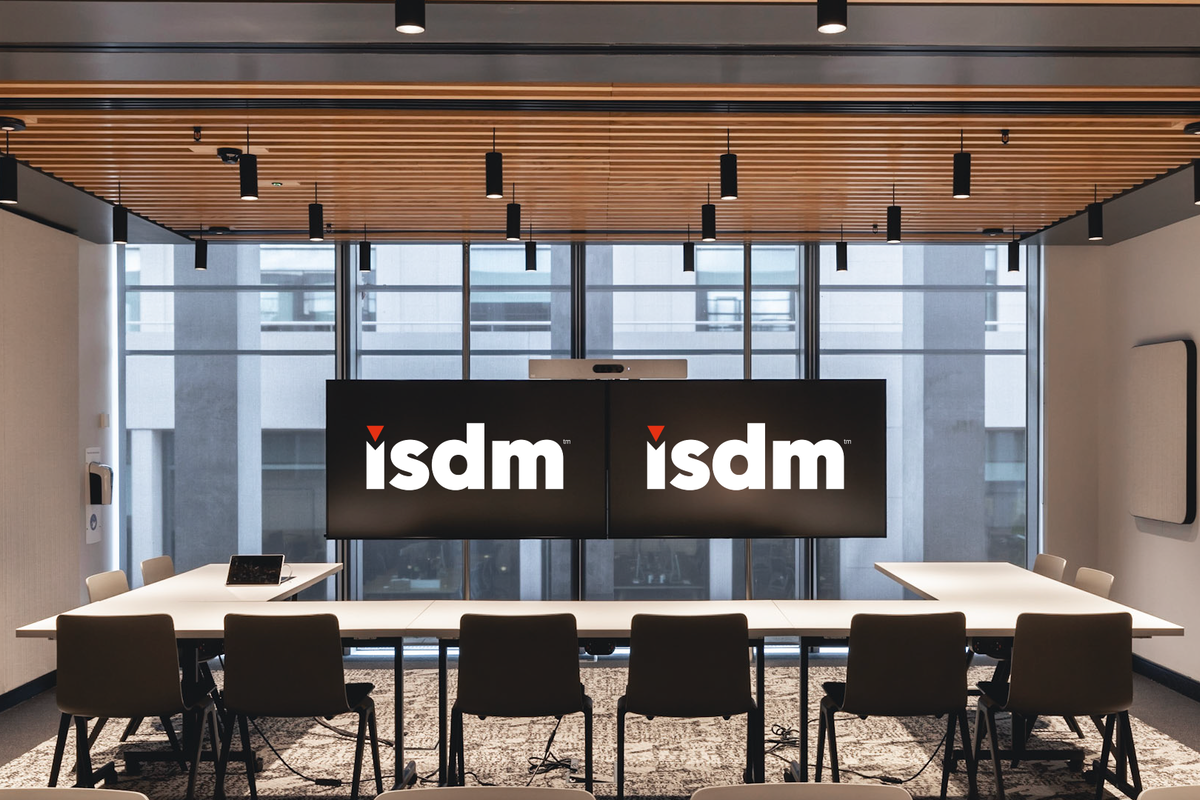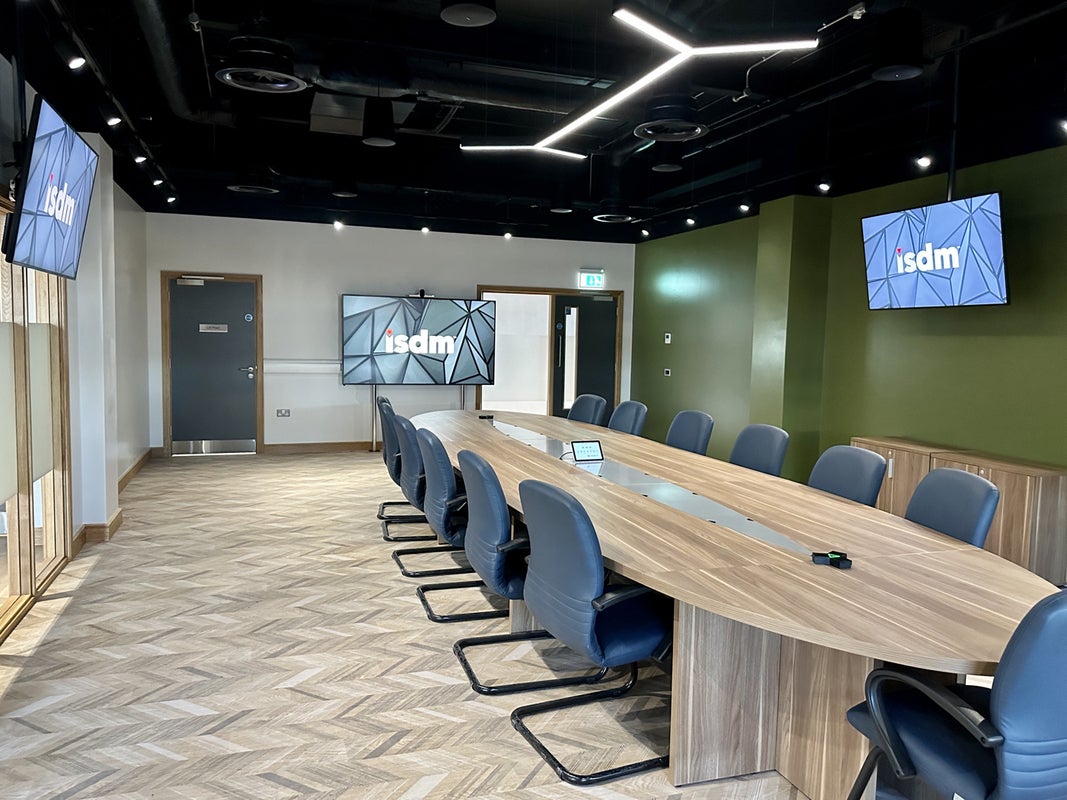
ISDM Solutions is a Business Reporter client
AV technology has a crucial role to play in supporting modern hybrid workplaces and overcoming its most critical challenges
Hybrid working is the way forward – there are no two ways about it.
The hybrid working model has emerged as the most popular way of working post-pandemic, with almost two thirds (62 per cent) of organisations worldwide implementing some degree of flexible work. Moreover, most employees (84 per cent) currently working remotely would prefer to have a mixed working culture of working from home and at their work location.
“No one believes in returning to the past, when work happened primarily with colleagues who adhered to fixed hours and locations whether it was necessary or not. Nor is the opposite extreme, where work is entirely remote and/or occurs at unpredictable times, a viable long-term strategy. People still want—and sometimes need—to meet physically, with predictable hours, to collaborate, cocreate, and congregate.”— Boston Consulting Group.
“There is ample opportunity to retain a healthy dose of flexibility and to mix the best of both going forward. This is a fundamental reshaping of the way that society goes about work and integrating that into life.”— Joe Ucuzoglu, US CEO, Deloitte
That’s not to say there are no opponents to this new way of working. Companies like Tesla, Google, Apple, etc. are adamant about having employees back in their offices. Tesla and Twitter CEO, Elon Musk, is a great example. In a letter to his employees at Tesla, he reiterated his stance that the employees must work in the office for at least 40 hours every week or otherwise risk being terminated.
These companies need to understand that, in this new era of work, success is defined by flexibility. It’s something employees, clients, business models, and markets now demand. Flexibility is vital in maintaining resilience and bolstering recruitment in today’s uncertain environment.
During the pandemic, organisations around the world were forced to quickly adapt to hybrid work. Due to the sudden shift, many found themselves improvising a tech stack that was complicated and inefficient.
So, as we settle into this new era where more and more companies are allowing staff to work using a hybrid model, it’s important for tech leaders to re-evaluate their current technology. It’s time to look at the best way forward and be mindful in selecting the right hybrid workplace technology.
The focus should be on fostering stronger employee collaboration while keeping the tech cost-efficient and sustainable in the long run.

Understanding the needs and challenges of a hybrid workplace
To create a successful hybrid environment, you need to be aware of the areas that need to be focused on. As a business leader, it’s important for you to understand the challenges associated with hybrid working to ensure a successful implementation.
One of the biggest challenges with hybrid workplaces is communication. Since team members work remotely or from different locations, you need to ensure that you invest in tools and technologies that encourage communication and collaboration such as video conferencing, instant messaging, or shared document platforms.
It is also essential to have a clear communication strategy in place.
Another challenge is maintaining a sense of team cohesion and connection among remote workers. It’s important to create opportunities for remote employees to connect with their in-office colleagues, such as virtual team-building activities, regular check-ins and other forms of engagement. They need to feel a part of the team no matter where they are working from.
The next big challenge is ensuring the security of the organisation’s data and network. For employees working remotely, there must be proper security protocols (such as next-generation firewalls, antivirus software, and remote access solutions) in place to protect your organisation’s network from cyber-threats.
Managing the different expectations and preferences of employees who work remotely and those who work from the office can also be a challenge.
Some other key challenges include:
- Controlling the costs associated with maintaining a hybrid setup
- Managing the schedules of employees working remotely or from the office
- Ensuring remote employees can access the necessary technologies and tools to work effectively, and providing them with the necessary hardware, software and support
It is also vital to ensure the hybrid policy and guidelines are communicated clearly to everyone to prevent confusion and misunderstanding.

AV technology has a major role to play
One of the biggest work-related lessons from Covid has been the realisation that technology is an important contributing factor in making remote and hybrid working a success. During the peak of the pandemic, we saw the use of video conferencing and collaborative tools skyrocket. While the switch was easier for some organisations, others took the help of expert consultants and advisors to seamlessly integrate these remote working tools.
Understandably, audio-visual (AV) technology has a significant role to play in creating better hybrid workplaces. AV solutions will empower employees with the freedom and tools to collaborate and connect seamlessly, thus enhancing communication, fostering collaboration, enabling employee support, and much more.
AV solutions can be used to create spaces within the office, such as huddle rooms or breakout areas, designed for one-on-one conversations alongside collaboration and meeting rooms for daily meetings with both in office and remote stakeholders.
With the right AV solutions, employees can remotely participate in meetings, presentations and training sessions, allowing for a more inclusive and engaging work environment.
For example, video conferencing can provide a way for remote employees to share and discuss ideas, brainstorm and collaborate on projects, and communicate with one another. This will help them feel more connected to their in-office colleagues, thus improving productivity, creativity and overall job satisfaction.
The right AV solutions can help create a more efficient and productive hybrid workplace. For example, using wayfinding signage systems and room or desk booking systems to efficiently manage office resources. Space management software like UMA can help create an excellent workspace experience by monitoring, analysing, and optimising physical space and inventory.
Additionally, smart whiteboards, digital signage and other AV solutions can be used to create a more interactive experience for employees.
AV solutions can also improve the physical and emotional wellbeing of employees by creating a more comfortable and healthy work environment. These collaborative solutions can empower meeting equality so that all participants have the same experience regardless of their location.
Finally, AV solutions help businesses reduce their operational costs. By providing remote employees with the necessary tools and technologies to work effectively, businesses can reduce the need for large, expensive office spaces, resulting in significant cost savings.
Implementing and choosing the right AV solutions
As you look to reimagine your hybrid workplace with the right AV solutions, keep in mind that your workplace must…
- …empower employees to be productive and engaged in their work
- …prioritise the physical and emotional well-being of your employees
- …be capable of supporting long-term business continuity and scalability
When it comes to choosing the right AV solutions for your hybrid workplace, there are a few key factors to consider.
First, it’s important to understand the specific needs of your organisation and employees. This includes assessing the types of collaboration and communication required, as well as identifying any pain points or challenges that need to be addressed.
For example, when choosing a video conferencing solution, consider the number of participants, the user interface, the format of meetings and any additional functionality such as Q&A, recording, screen sharing and a high number of video streams. Remember, a poor choice or integration of AV tools may hinder effective communication, leading to a decrease in productivity and efficiency.
Another important factor to consider is the compatibility of the AV solutions with your existing technology stack. It should seamlessly integrate with your current tools and systems, other meeting room setups and third-party applications.
Finally, it’s important to choose solutions that are easy to use. This will help ensure that employees are comfortable and confident in using the technology, thus improving overall productivity and engagement.
While it sounds simple, when it comes to the actual process of choosing the right AV solutions for your business, the process can be overwhelming. With so many options and factors to navigate, it can be difficult for businesses to ensure that the solutions they choose fulfil all the above requirements.
This is where an AV service provider such as ISDM Solutions can help.
As a leading provider of AV solutions, ISDM understands the importance of user experience and works closely with clients to design and implement technology solutions that are tailored to their specific needs.
With its expertise in designing, deploying and supporting AV solutions, the company can assist you in identifying your specific requirements, finding the right tools and ensuring they integrate with your current systems.
ISDM’s collaboration and AV solutions aim is to empower meeting equality in the hybrid workplace, making all participants feel like they are sitting in the same room.
Partnering with ISDM can help you streamline the process and create a more efficient, productive and engaging workplace that supports all employees. This will ensure that your hybrid workplace is set up for success.
To find out more about how ISDM can help you, visit this page.
Originally published on Business Reporter







